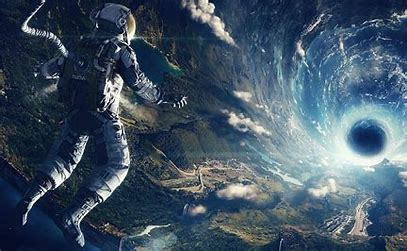"The Mysteries of Space-Time: Exploring Wormholes and Time Travel"
The concept of space-time, a cornerstone of Einstein's theory of General Relativity, has captivated scientists and science fiction enthusiasts alike. This four-dimensional continuum, combining three dimensions of space and one of time, provides the framework for understanding the universe's structure and the forces that govern it. Within this framework lie some of the most intriguing and speculative ideas: wormholes and time travel. These concepts push the boundaries of our understanding and offer tantalizing possibilities for future exploration.
The Cosmic Detours: Wormholes:
Einstein-Rosen bridges, or wormholes, are speculative tunnels through space-time that might link far-off regions of the cosmos. Think of the cosmos as a two-dimensional piece of paper. The two far-off places on the paper become closer if you fold it and punch a hole. Similarly, a wormhole operates, potentially permitting instantaneous travel across great distances in space.Einstein's field equation answers give rise to the concept of wormholes. According to these answers, space-time might be bent in specific ways to produce a structure like a tunnel. The practical presence of wormholes is still entirely hypothetical despite the mathematical plausibility of this concept. They have not yet been proven to exist through experimentation, and their possible formation and stabilization present formidable obstacles.
Time Travel: The Paradox of Space-Time
One of the most famous time travel paradoxes is the "grandfather paradox." This paradox questions what would happen if a time traveler went back in time and prevented their own grandfather from meeting their grandmother. This action would prevent the time traveler's birth, creating a logical inconsistency. Such paradoxes highlight the complexities and potential contradictions involved in backward time travel.
The Quantum Connection
The intersection of quantum mechanics and general relativity offers another avenue for exploring the mysteries of space-time, wormholes, and time travel. Quantum gravity, an as-yet-unformulated theory, aims to reconcile these two foundational pillars of physics. Concepts from quantum mechanics, such as entanglement and superposition, may provide insights into the nature of space-time at the smallest scales.
Some physicists propose that wormholes could be related to quantum entanglement, with "ER=EPR" (Einstein-Rosen=Einstein-Podolsky-Rosen) suggesting a deep connection between these phenomena. This idea, though speculative, points to a future where a unified theory of quantum gravity might reveal the true nature of space-time and its potential for wormholes and time travel.
Conclusion: The Future of Space-Time Exploration
The mysteries of space-time, encompassing wormholes and time travel, represent the frontier of modern physics. While these concepts remain largely theoretical, ongoing research continues to push the boundaries of our understanding. Advances in experimental techniques and theoretical frameworks may one day unlock these cosmic secrets, transforming our approach to space exploration and our understanding of the universe.





No comments:
Post a Comment